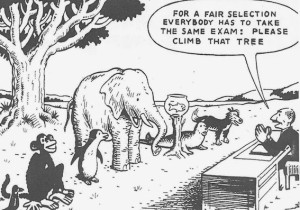The problem with being promoted on ‘merit’
“Homo WHAT reproduction?”, asks a friend of mine wondering why I would think that sexual orientation and children lead to inequality regimes and discrimination.
“No, homoSOCIAL reproduction” I reply.
It’s a common mistake because so few people have even heard of homosocial reproduction, or the tendency for people to promote others who are like themselves. But given that issues of inequity are still rife, as evidenced by a lack of diversity (race, gender, class etc) in the top management teams of many organisations, and given that sometimes the biggest opponents of measures to improve equality are people from the oppressed group (e.g. the Women’s Anti-Suffrage Movement claiming that giving women the right to vote was a dangerous experiment), I feel the need to shout this from the roof tops:
PEOPLE HAVE AN UNCONSCIOUS TENDENCY TO PROMOTE OTHERS WHO ARE LIKE THEMSELVES AND/OR THE DOMINANT CULTURE.
According to Rosabeth Moss Kanter, there are three main reasons why this can occur.
- Uncertainty and the need for trust
- Ease of communication
- Difficulties in measuring managerial performance
Managers have to deal with a lot of ambiguity in their roles and that means that we like to promote people who will make good decisions. This means that we need to trust them and perhaps see eye to eye (noting however, that diversity of thought usually leads to better performance outcomes). Thus, the further you rise up the managerial chain, the more ambiguous our roles become and the more subjective ‘merit’ is especially when you consider the effects of teams on individual performance. Instead our mental template of what constitutes a ‘great’ leader takes over and ‘objective’ outcomes are often hindered by the unconscious biases that are lying deep within our psyche. This means that unless we are specifically looking for it, we might end up promoting someone who is like ourselves and/or the dominant culture, rather than someone who might bring diversity of thought to the team and lead using a different, but equally effective, style.
Noting that I have often worked in male dominated environments, some of the best leaders I knew did not meet the requirements of the ‘boys club’ because they stood by their ethics and authenticity. Despite being excellent leaders with great communication, empathy and team performance results, they found themselves trapped by a glass ceiling because they perhaps did not ‘tick the social box’, be that a beer drinking ‘lad’, a ‘heroic’ leader who is going to swoop in and save the day (as opposed to a facilitative leader who inspires the team to save the day), or some other shallow template of trustworthiness.
So what can we do to help overcome the inequity that results from homosocial reproduction?
- First of all, be AWARE that it exists
- Secondly, recognise that ‘merit’ is highly subjective when it comes to managerial team performance, and like a good sports team, you don’t just choose the top players, rather you choose a diverse and talented group that through synergy become a top TEAM
- Thirdly, support quotas, diversity metrics and HR policies that seek to dismantle the inherent inequality and unconscious bias that exists within organisational systems
- Finally, come to understand yourself. Test your unconscious bias using the Harvard Implicit Association Test at https://implicit.harvard.edu/implicit. You might be as surprised by the results as I was!

